
It is another's fault if he be ungrateful, but it is mine if I
It is another's fault if he be ungrateful, but it is mine if I do not give. To find one thankful man, I will oblige a great many that are not so.






The words of Seneca, the Stoic sage of Rome, echo across centuries: “It is another’s fault if he be ungrateful, but it is mine if I do not give. To find one thankful man, I will oblige a great many that are not so.” In this, he speaks with the clarity of one who has wrestled long with the human heart. He reminds us that the measure of virtue is not in how others receive our gifts, but in how freely we extend them. The act of giving is ours alone; the response belongs to others. To demand gratitude in return is to bargain, not to give. But to offer freely, knowing that many will be blind or hardened, and yet to rejoice when even one soul is thankful—this is the mark of wisdom and strength.
Ungratefulness has ever been one of the sorrows of the world. It wounds the spirit when kindness is met with silence or scorn. Yet Seneca bids us not to withhold good because of it. For ingratitude is the fault of the receiver, not the giver. If we let the fear of ingratitude close our hand, then we ourselves become barren, deprived of the noble joy of generosity. It is better to plant many seeds, though most fall upon stony ground, than to hoard them and see no harvest at all. One seed that blossoms in thankfulness is worth the cost of a hundred wasted.
History bears witness to this truth. Consider the life of Florence Nightingale, the Lady with the Lamp. She gave her strength, her youth, her unceasing care to wounded soldiers in the Crimean War. Many never thanked her, some even reviled her efforts, but she did not cease to give. She declared that she sought not recognition but the relief of suffering. And yet, from among the many who never lifted a word of gratitude, arose a multitude in later generations who blessed her name and were inspired by her courage. Nightingale’s life proves Seneca’s teaching: that the duty to give does not rest upon the worthiness of the receiver, but upon the integrity of the giver.
The ancients feared the corrosion of the heart that comes when generosity is bound to reward. For when the giver demands repayment, he ceases to be free. But when he gives as the sun gives—pouring warmth upon the just and the unjust alike—he is invincible. His joy is not bound by the responses of others but rooted in the nobility of his own soul. And when at last he encounters one who is thankful, that joy is doubled, made brighter by the rarity of its discovery.
This teaching is not soft or naive, but heroic. It calls for a courage greater than battlefields: the courage to endure indifference and still remain generous, to be slighted and still to bless. For the proud heart says, “I will give only where I am honored.” But the wise heart says, “I will give because giving is right.” The first binds itself in bitterness, the second soars in freedom.
What lesson, then, must we carry? It is this: do not allow the ingratitude of others to poison your spirit. Continue to give—time, kindness, help, wisdom—even if most do not thank you. For your goodness does not lose its worth simply because it goes unacknowledged. Indeed, the true reward of giving is found in the act itself, and in the shaping of your soul into one that mirrors the divine.
Practically, let each of us choose a path of steadfast generosity. Offer help without waiting for recognition. Speak words of kindness without demanding reply. Share what you have—be it wealth, wisdom, or simple presence—with open hands. And when you encounter the rare soul who is truly thankful, treasure that moment, for it is a jewel amid the stones. But do not cease to sow, for it is better to bless many and be forgotten, than to bless none and become empty.
Thus, Seneca’s wisdom becomes a guide for all ages: another’s ingratitude is his burden, but our refusal to give is ours. Give, then, as though the world depended on it—for in truth, it does. And even if only one man is thankful, the light of your gift has not been in vain.






AAdministratorAdministrator
Welcome, honored guests. Please leave a comment, we will respond soon